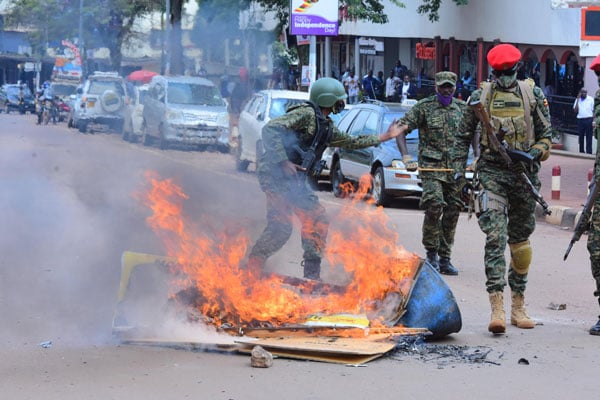Only in Uganda where everyone wants to be president – Gen Elwelu

What you need to know:
- The Deputy Commander Special Forces Command (SFC) Brig Charity Bainababo told journalists to ask President Museveni for things that will transform their personal lives.
The Deputy Chief of Defence Forces Lt Gen Peter Elwelu has urged journalists to always be professional and refrain from the temptation of spreading misinformation and propaganda which could plunge the country into chaos.
According to Gen Elwelu, who is also one of the 10 Uganda People’s Defence Forces (UPDF) representatives in Parliament, journalists ought to be agents of positive change and promoter of the wellbeing and sustainability of citizens.
“If you were indeed spreading positive massages to our people, we would not have had the deaths of people during 2009 Kayunga riots and the November 2020 riots," Gen Elwelu told hundreds of journalists gathered at Kyambogo University in Kampala for a five-day residential symposium organized by State House in conjunction with Uganda Journalists Association (UJA).
More than 40 people were killed during two days of civil unrest in Kampala which started September 10, 2009 when police blocked a delegation representing the Buganda kingdom from visiting Kayunga District.
In 2020, more than 50 people were killed when security operatives stormed the streets to contain two-day riots sparked on November 18 by the arrest of then presidential candidate Robert Kyagulanyi alias Bobi Wine in Luuka District.

According to Gen Elwelu, many Ugandan journalists believe in lies and propaganda.
“We understand mistakes are done but don't overdo it. You first look into what you disseminate because it has the potential of causing problems. Let us promote peace and love for each other," he said.
According to him, Uganda is a unique country and thus needs a skillful leader steer it to peace and stability.
“Uganda is not an ordinary country. When something happens here, you see European Union (EU) Parliament deliberating about it. It’s only in Uganda where everyone thinks they can be president; Generals, pastors, musicians, among others want to be president. One day a journalist might come up and say ‘I am here vote me.’ You stick to your profession," he said.
According to organisers, about 600 journalists are attending the symposium expected to be graced by President Museveni before its closure on February 11.
"The focus for the NRM government and you journalists is to help and support poor people to get out of poverty at household level so that people produce for industries through agricultural production," Vice President Jessica Alupo said moments after arriving at the event.
However, addressing journalists after Gen Elwelu, the Deputy Commander Special Forces Command (SFC) Brig Charity Bainababo told journalists to ask President Museveni for things that will transform their personal lives.
This is premised on the fact that journalists in the Uganda are among the poorly-paid professionals in the country of 45 million people and as result, many have been compromised as they strive for survival.
According to Brig Bainababo, the symposium will foster development, unity, solidarity and international cooperation through the positive reporting by trained journalists.
"My joy will be to see each Ugandan produce food for themselves because poor people are hard to manage. When you (journalists) meet the president don't ask him things that will challenge him because the president is not challenged. Ask him things that will benefit you and transform your lives,” Brig Bainababo who is also a UPDF representative in the 11th Parliament said at the event which is the first of its kind.
Mr Ronnie Bantu, a programme manager at Kings broadcasting services argued that the symposium will help in containing hate speech, radicalization, inequality and political extremism among some media personalities in the country.
Uganda under Mr Museveni, 78, as its leader since 1986 when he assumed power has seen a series of crackdowns on those opposed to his rule, particularly around the 2021 election, with journalists attacked, lawyers jailed, vote monitors prosecuted, the internet shut down and opposition leaders violently muzzled.




